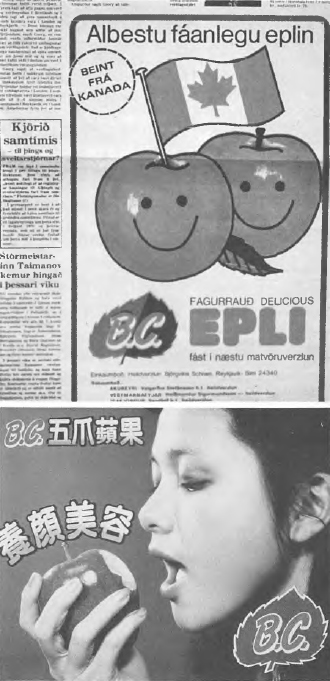News & Events More |
The Hudson ReportAt the same time as the Standing Committee on Agriculture was conducting its review of agriculture-in-general in British Columbia, Dr. S. Claude Hudson, former Director-General of the Economics Branch of the federal Department of Agriculture, was hired to conduct a review of the income problems of tree fruit growers with particular attention to apples. 
He was instructed to recommend a program of government assistance to "ensure a more stable and a more adequate level of net income for growers," and to recommend ways in which the government could assist "in achieving a more adequate level of net income for apple growers." The briefs presented to government over the past year had shown there were problems. The Minister of Agriculture, David Stupich, wanted solutions which would be acceptable to the growers. The Hudson Report, of September, 1973, strongly upheld the concept of one-desk selling and condemned the tactics of many of the dissidents, who were deliberately attempting to destroy the confidence of the growers and the public by circulating statements which were "half-truths at best." It was pointed out that some growers who had older trees bearing substandard fruit were unaware of the reasons for their inadequate financial returns: the lack of quality in their own crops. Therefore, they shifted the blame onto the B.C.EG.A. and B.C. Tree Fruits Ltd., rather than trying "to improve some of their own technical and managerial weaknesses." Dr. Hudson commented indignantly: It is unthinkable that they should be allowed either to destroy a marketing system which has functioned well and generally has the support of a majority of growers, or to use it as an umbrella for their own private profit at the expense of others. Studies had shown that B.C. Tree Fruits achieved significantly higher returns than other comparable fruit marketing cooperatives in Ontario or the northwestern United States. It was the distance from markets which made central one-desk selling essential to the successful operation of a commercial apple industry in British Columbia. However, perhaps to resolve the matter once and for all, Hudson called for a plebiscite on one-desk selling. 
Aside from addressing the marketing issue, the Hudson Report also gave an optimistic overview of the tree fruit industry. It emphasized that tree fruit growing was economically viable and essential to the economy of the region. It pointed out that the Farm Credit Corporation had never had to foreclose on a loan made to an Okanagan orchardist. However, some growers did not share this optimism. Hudson attributed the prevailing pessimism to three main causes. First, buoyed by the high returns of 1967-1969, some growers had overextended themselves financially. Second, due to the freeze in the winter of 1969, growers had borrowed heavily to replant. Third, the low returns experienced from 1969 to 1971, and the lack of confidence created by the Land Commission Act, extended far beyond those individual growers who may have been in financial trouble. Hudson noted further that in addition to individual financial stresses, there were structural tensions between packing houses and B.C. Tree Fruits Ltd. The negative feelings dated back to the 1919-1939 period when the growers' association and shippers were fighting. In 1973, fourteen of the eighteen packing houses, which also controlled shipping, were owned by grower cooperatives. There was still an historical legacy of "bitterness and mistrust." B.C. Tree Fruits, although unfairly blamed, had not done a good job in its public relations with the growers. Even among the packing houses themselves, there was a lack of a strong coordinating force. Ironically, the B.C.F.G.A., which was based on working together for the benefit of all, needed to strengthen its co-operative endeavours. Although the tree fruit industry was inherently sound, there was a need for organizational integration, and packing and storage efficiencies, in order to meet the challenges of the future and to improve the morale of the growers. Hudson recommended a number of programs for grower assistance and general restructuring. To increase the market returns to growers, he said there should two major changes: price stabilization and packing house amalgamation. In addition, he advocated crop insurance, assistance in replanting, more government horticultural extension services, and refinancing and restructuring of the industry. Acting independently, farmers could participate in local marketing endeavours such as organizing farmers' markets or supplying restaurants with fresh fruit. During the same September in which Hudson finished his report, the government was taking steps to introduce Bill 9, the Farm Income Assurance Act, for its first reading in the Legislative Assembly. Contact Us Hours: 9am - 4pm weekdays. t: 250-762-5226 |

